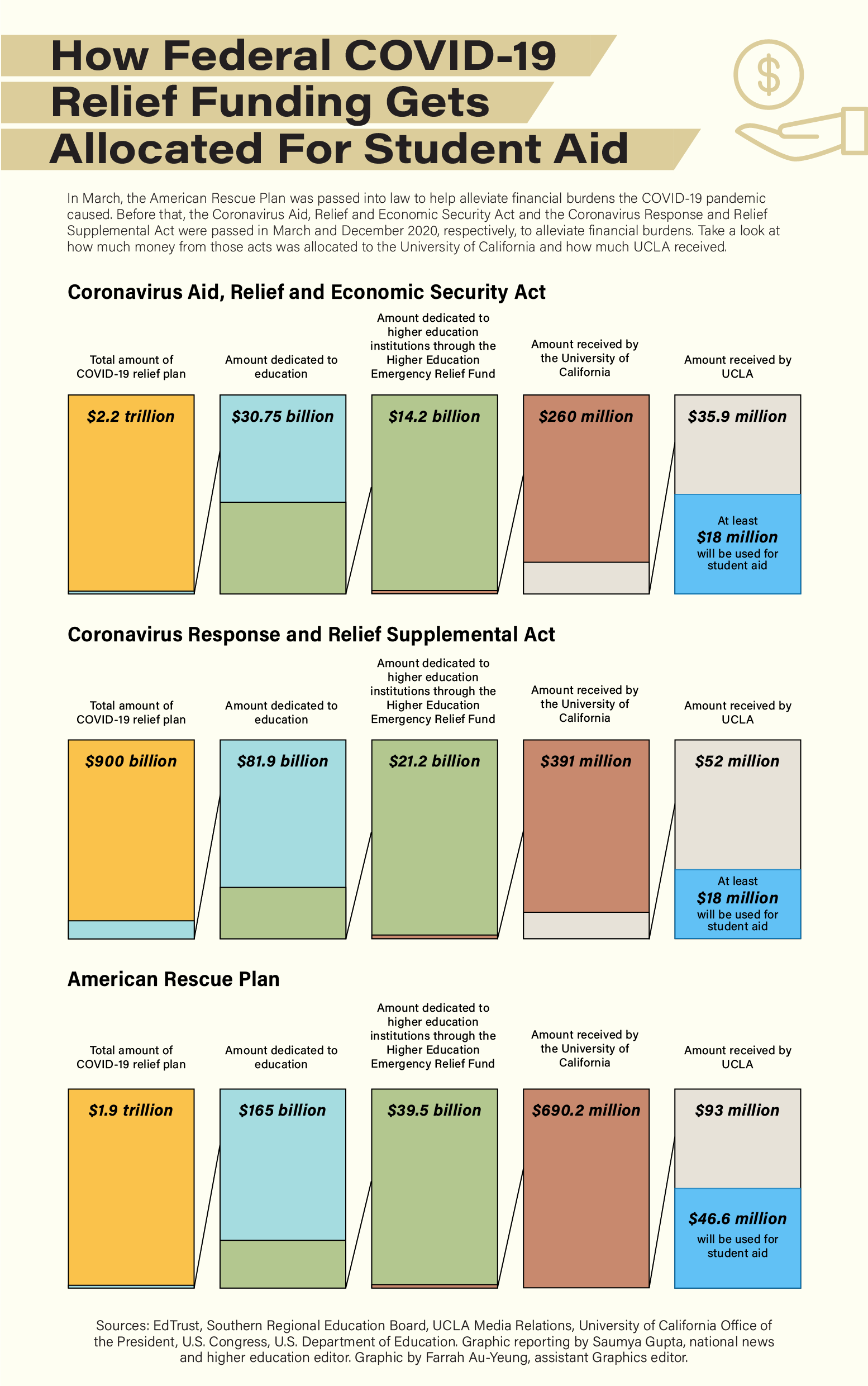Students concerned about inefficient distribution of relief funds during pandemic

By Hanna Sato
May 12, 2021 9:28 p.m.
This post was updated May 16 at 9:23 p.m.
UCLA’s delayed distribution of emergency relief funds has placed a financial burden on those who need it most, some students said.
U.S. Congress passed the Coronavirus Response and Relief Supplemental Appropriations Act in December, which formed the Higher Education Emergency Relief Fund II. The fund allocated $52.6 million to UCLA, with $17.9 million intended for student aid.
On March 11, Congress passed the American Rescue Plan, allocating an additional $93.2 million to UCLA with more than $46 million reserved for students.
More than five months since CRRSAA’s passing and two months since the American Rescue Plan’s passage, UCLA has yet to begin distributing funds to students.
Several universities such as Brown University, UC Davis and UC Santa Barbara have already distributed funding to students. Brown University began distributing CRRSAA funds March 8 on a rolling basis, UCD began distributing CRRSAA funds April 9 and UCSB distributed CRRSAA funds March 3.
The university is waiting for guidance from the Department of Education on funds and is creating a committee to discuss proposals on allocating the funds to students, said UCLA spokesperson Katherine Alvarado in an emailed statement.
“Regarding the HEERF funds from the March stimulus package, the U.S. Department of Education has not indicated a timeframe for distribution at this time,” Alvarado said.
The unclear timeline for aid is concerning for students in need of financial support during the pandemic, said Shilp Shah, a first-year bioengineering student.
“While getting this money later on for some individuals would be beneficial because they were able to suffice without this financial injection beforehand, a lot of other people do not have that luxury where they can afford to wait it out,” Shah said.
Graduate students are also in need of financial aid from UCLA as soon as possible – many of them have lost their jobs, had hours reduced or needed to take on additional financial responsibilities, said Letty Treviño, vice president of academic affairs for the Graduate Students Association, in an emailed statement.
Under the CRRSAA, undergraduate, graduate and professional students who meet the basic eligibility for federal financial aid will be considered to receive these funds. Eligibility is determined by completing the FAFSA, but this excludes undocumented and international students.
However, under the American Rescue Plan, students only need to have been or currently be enrolled in a higher education institution during the COVID-19 pandemic to receive funds – this includes undocumented and international students.
UCLA has also increased financial burdens on students by failing to remove and refund certain fees such as gym or facility fees, said Aidan Arasasingham, the Undergraduate Students Association Council external vice president.
“At the beginning of the pandemic, students rightly were concerned and continue to be concerned about certain campus-based fees that might not be necessary,” said Arasasingham, a fourth-year global studies student.
According to the UCLA Registrar’s Office, there will be no reduction in tuition or fees despite several resources, such as the Wooden Center, being unavailable to students amid the pandemic. Tuition and fees for students are set, regardless of whether instruction is remote or in person, according to UCLA.
Arasasingham added that UCLA will not be adjusting tuition and fees in order to maintain employee salaries, upkeep campus and continue to provide student resources.
UCLA should revise the tuition costs and funding systems for graduate students to take into account the high cost of living in Los Angeles, Treviño said.
Treviño said stimulus packages and government funding will not be enough to support both undergraduate and graduate students in the future, and restructuring the university’s financial system is needed.
“Every day that a student doesn’t receive that kind of (support) is a day that that money could have been spent on rent, on food, on basic needs that a student has to pay out of pocket,” Arasasingham said. “So every day that is delayed is a day that basic needs challenges continue to be exacerbated.”


